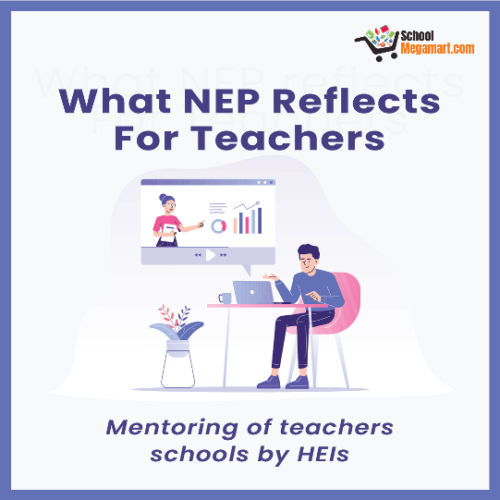
Mentoring of teachers/schools by HEIs
Higher education is the education that a student receives after completion of his/her school education. We have different bodies that regulate the activities and curriculum of higher education like UGC, AICTE, etc. But now all these bodies are replaced by a single regulatory body called Higher Education Institutions (HEI). India has been considering a single higher education regulator for the past decade. The single higher education regulator plan has moved back and forth several times but has finally been approved in this new NEP. These HEIs has provisions for teachers and schools and they also monitor the activities and curriculum of the schools. The main objective of HEIs is to foster the quality education for children.
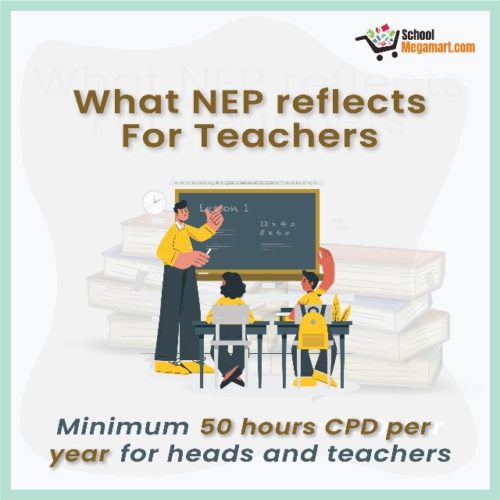
Minimum 50 hours CPD per year for heads and teachers
The most important role in the lives of students in their classroom is Teachers. This is so because teachers bear the responsibility of educating the children placed in their care. The new NEP 2020 also emphasizes on the development of teachers and their profession and brings a concept of CPD. CPD stands for Continuing Professional Development and is a planned, continuous and lifelong process where teachers try to develop their personal and professional qualities. CPD includes various learning activities in which professionals get engage to develop and enhance their abilities. 50 hours CPD per year will improve knowledge, skills and practice of teachers and heads of academic institutions.
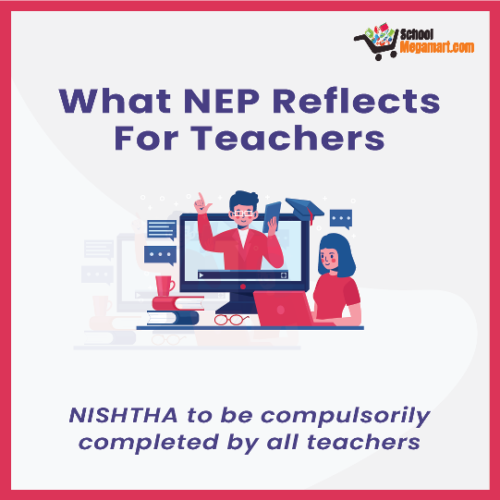
NISHTHA to be compulsorily completed by all teachers
The Department of School Education and Literacy has launched a National Mission to improve learning outcomes through an Integrated Teacher Training Programme called NISHTHA. National Initiatives for School Head’s Teacher’s Holistic Advancement (NISHTHA) is a capacity building programme at the elementary level under the Centrally Sponsored Scheme of Samagra Shiksha. It aims to build competencies among all the teachers and school principals. This programme also aims to improve quality of school education through integrated teacher training. NISHTHA is the world’s largest teachers’ training programme of its kind. It also motivates and equips teachers to encourage critical thinking of students.
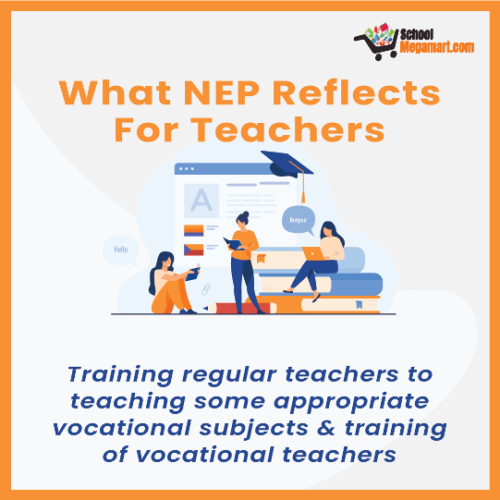
Training regular teachers to teaching some appropriate vocational subjects and training of vocational teachers
An important lens that is often employed when looking at the quality of teacher’s education is that of the professionalism of teachers. Vocational self-identity and trainers are essential to supporting skills development in the workforce. So, the NEP 2020 also has a criterion for training of teachers so that they can promote vocational education. This initiation is the step to upgrade the low status of vocational education. Training of regular and vocational teachers will surely reduce the problem of increasing the status of the teaching profession.
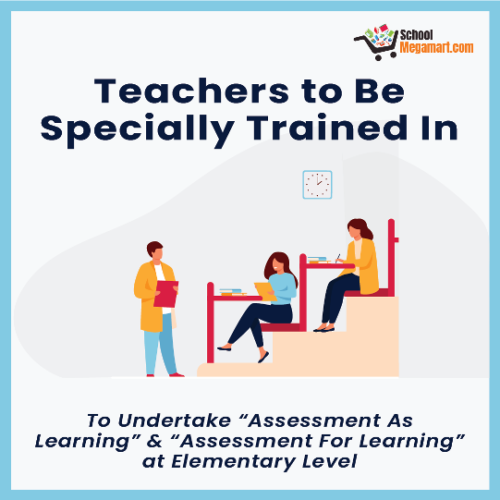
To undertake “Assessment As Learning” and “Assessment For learning” at the elementary level
The new National Education Policy (NEP) has demonstrated a clear will to move the needle away from the old type of learning. The policy recommends a shift in the focus of evaluation from certification to improvement in learning. This new policy will train teachers to undertake “Assessment As Learning” and “Assessment For learning” as an attempt to shift from content-based assessment to competency-based assessment. The journey of student assessment has gone a long way passing through oral testing and written testing. It also includes the public examination, internal and external assessment. Teachers should be trained in such a way that they can conduct a regular, formative and competency-based assessment. The new style of assessment promotes the learning and development of students.
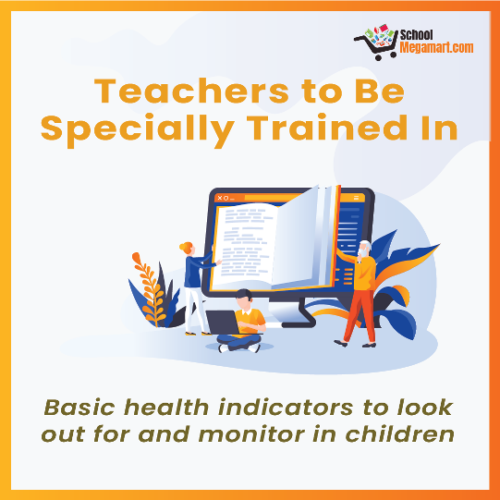
Basic health indicators to look out for and monitor in children
Nothing is important more than the health of a child. Health education is a primary goal of NEP. The policy includes all the basic health indicators like nutrition, physical education, fitness, wellness, sanitation and hygiene. All these health indicators should be identified by teachers and monitored by them. A child can develop completely from all the aspects when he/she is healthy. Teachers should be trained so that they can make students learn some of the key subjects. Trained teachers also can enhance the skills and capacities of a child by monitoring his/her healthy habits. So, the NEP proposes the inclusion of training in health including mental health, good nutrition, personal and public hygiene, disaster response, etc. The policy also includes first-aid, and detrimental effects of alcohol, tobacco and other drugs, as part of the school curriculum.
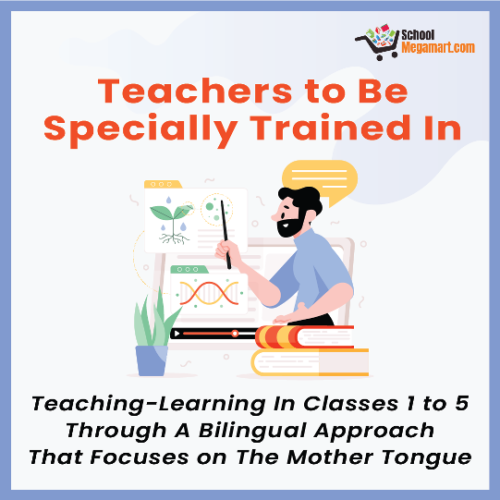
Teaching Learning in Classes 1 to 5 Through a Bilingual Approach that Focuses on the Mother Tongue
We exchange our thoughts, views, and information through means of language. So, language can be a medium and a hindrance in our communication. In teaching and learning, language plays a crucial role and without proper use of it, teachers and students could not establish a relation. The first education policy in 1968 has already recommended the ‘Three-Language’ formula. Now, the NEP 2020 has allayed concerns on this. The language policy emphasizes the medium of instruction in regional or mother tongue in a broad guideline. The policy also says that teaching and learning should be done in bilingual language so that teachers can clear the concepts of students especially from classes 1 to 5. The NEP also recommends that all students will learn three languages and at least two of the three languages should be native to India.
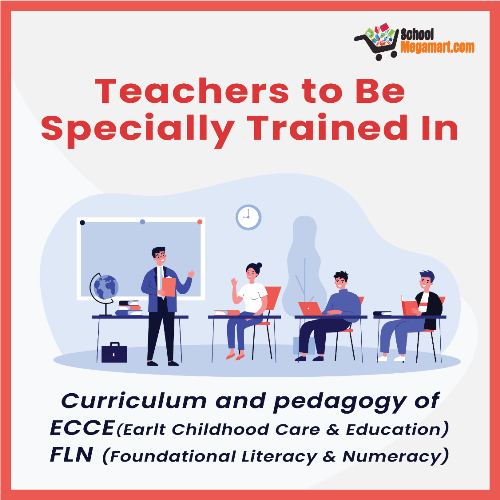
Curriculum and Pedagogy of ECCE/FLN
The period from birth to eight years is called Early childhood. It is a time of remarkable growth with brain development. During this stage, children are highly influenced by the environment and the people that surround them. Early Childhood Care and Education (ECCE) is more than preparation for primary school. Moreover, NEP has announced National Foundational Literacy and Numeracy (FLN) Mission. It is an important step that ensures an improvement in curriculum and pedagogy of learning and quality education. It aims that children by grade 3 will have critical gateway skills of reading with meaning and basic maths. For this, the new NEP has proper guidelines and a systematic structure of curriculum and pedagogy of ECCE/FLN.
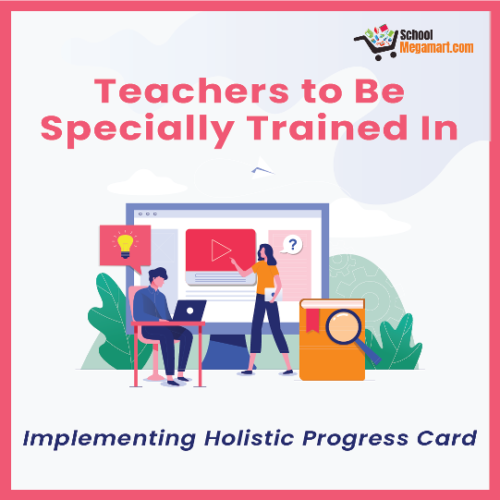
Implementing Holistic Progress Card
The New Education Policy 2020 redesigned the progress card of all students for school-based assessment. Now training is given to the teachers that help in implementing the holistic progress card. This holistic progress card is a 360-degree multidimensional report card that evaluates all the aspects of a child. The implementing this holistic progress card will reflect the details as well as the uniqueness of each learner in the cognitive, affective, and psychomotor domains. Following the policy, the student’s card includes self-assessment, peer assessment and progress of the child in project-based and inquiry-based learning. Teachers check the progress of a child by organizing quizzes, role plays, group work, portfolios, etc. The holistic progress card will form an important link between home and school.
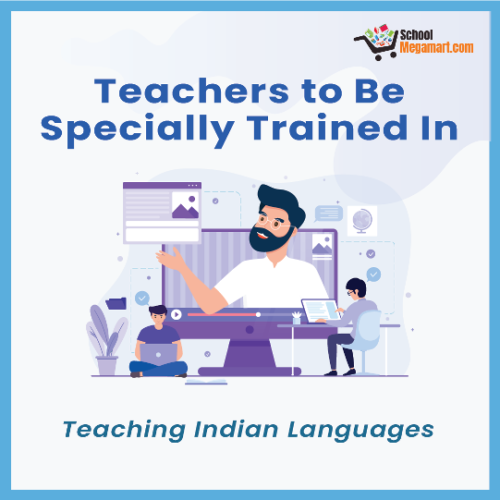
Teaching Indian Language
India is a country with a treasure of cultural heritage in the forms of Arts, Custom, Literature, Tradition, Artifacts, and much more. India is a country with languages changing every 15 to 20 Km according to the native communication style. So, it is important to preserve the culture and wealth of India for the nation’s identity and its economy. Various studies show that young children best understand things in their mother tongue or home language. So, it is very important to promote teaching in Indian Languages. The NEP 2020 has given all the flexibility to the schools, the States and the parents as well as the community to teach in their chosen languages. Teaching and learning of Indian languages need to be integrated with school and higher education at every level. Teaching and Learning Material (TLM) will also be available in these Indian languages including textbooks, workbooks, videos, plays, etc.
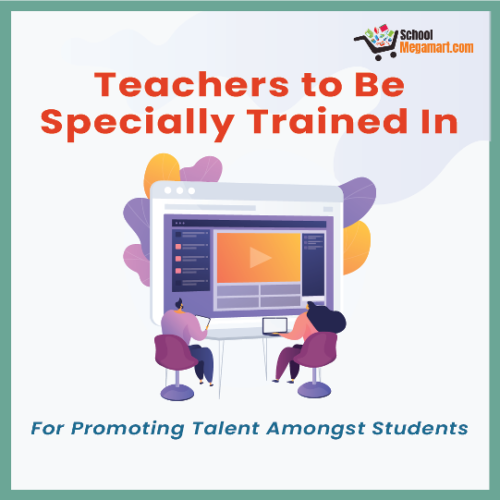
For promoting Talent amongst students
To facilitate holistic development among the students, the new education policy has a criterion for teacher’s training. However, this holistic development means development from all the aspects including all three domains of learning. This new child-centered education has a scope to make a child fit and capable in all sectors in life. For this, a teacher should be trained so that he/she can enhance the skills of children. Educators will organize some events to identify the talented students. Also need to change their pedagogy in such a way that it will help for promoting talent amongst students. Teachers should be trained in such a way that they can identify the skills of the children. Moreover, teachers will also be able to encourage students and need to polish the skills of students for promoting talent amongst students.
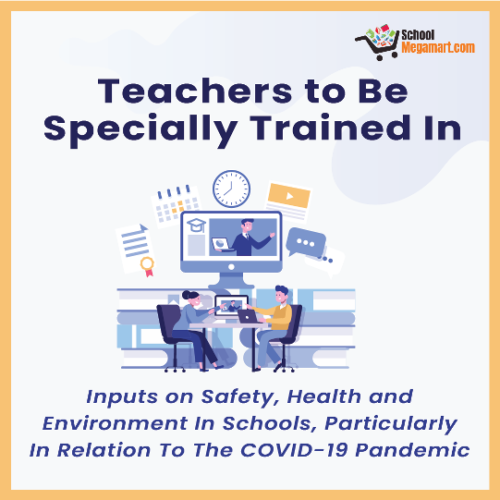
Inputs on Safety, Health, and Environment In Schools, Particularly In Relation To The COVID-19 Pandemic
The NEP 2020 states that teachers should pay more attention to the health of children. A child goes to school without his/her close ones. Children spend almost half of the day on the school premises. So, they are the responsibility of school administration. The new education policy will train teachers and make them skillful in using the inputs on safety, health and environment. Teachers and educators play an important role in spreading awareness related to health and its safety measures. Teachers will be able to teach students about the recent ongoing pandemic COVID-19 and its safety measures. They will encourage students to use face masks, hand sanitizers and maintain social distancing. Teachers will also learn the ways to use inputs of safety, health and environment.
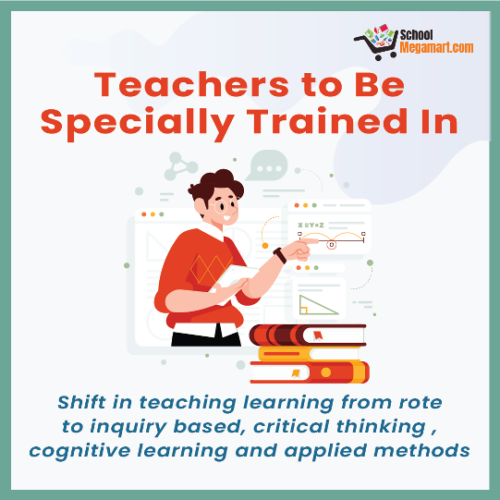
Shift in teaching learning from rote to inquiry based, critical thinking, cognitive learning and applied methods
The latest reforms in education also propose a new curricular and pedagogical structure, with a 5+3+3+4 design. This design includes the foundational Stage, Preparatory Stage, Middle Stage and Secondary Stage. The main aim to divide the grades of students in such stages is to bring a shift in teaching-learning. The trainings for teachers is focusing to minimize rote learning and encourage the holistic development of a child. A shift in teaching style will develop skills such as critical thinking, creativity, scientific temper, communication, etc. Inquiry-based learning and applied methods also encourage collaboration, multilingualism, problem solving-ethics, social responsibility, and digital literacy among students. This would make space for holistic, discussion and analysis-based learning.
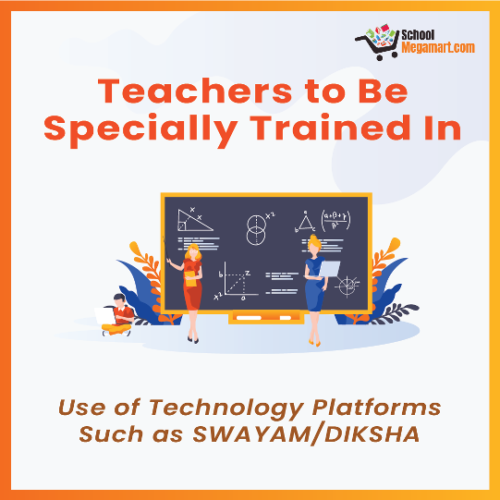
Use of Technology Platforms such as SWAYAM/DIKSHA
After the outbreak of COVID-19, education has changed dramatically. With the distinctive rise of e-learning, teachers also started using digital platforms to teach. Education Ministry already has a criterion for education related to technology. But, in such time the pandemic increases the value of e-learning. The new policy has encouraged the use of technology platforms such as SWAYAM/DIKSHA for teachers. Proper training should be given to the teachers who are backward in technology or have a techno-phobia.
The training will develop the skills of teachers so that they can use these skills while delivering the knowledge to the students. DIKSHA will serve as National Digital Infrastructure which leverages existing highly scalable and flexible digital infrastructures for Teachers. Government of India initiated SWAYAM a program that aims to achieve the three cardinal principles of Education Policy i.e. access, equity and quality. So, the use of technology platforms is very important for teachers.

Time –Tested As Well As The Most Recent Techniques In Pedagogy
Over the last decade, India has transformed itself into an ‘information-intensive society’. So, there is a growing requirement to embrace the usage of time-tested as well as the recent techniques of pedagogy. Equipping a child with the right mind maps, intuition and skill is the only way to prepare them for what lies ahead. Teachers will be able to use new techniques in education that will help to facilitate the time-tested learning. This will modify the learning of a student in such a way that he/she can easily face the challenges of the new world. The new learning techniques for modern pedagogy brings the very best out of study sessions. Also, time-based learning is necessary for our children to truly succeed in this ever-changing fast-paced world.
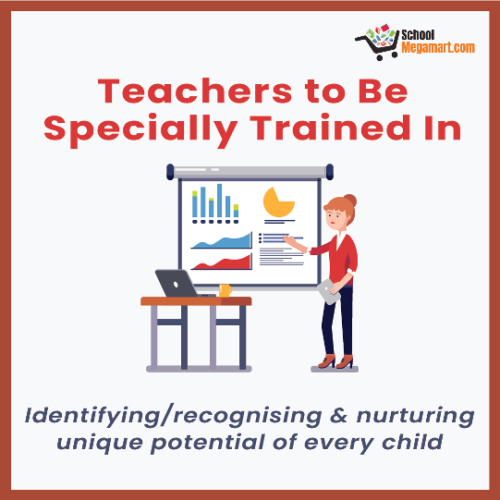
Identifying/recognizing and nurturing unique potential of every child
Every child is unique and special in their own way. Nature blessed all children with unique sets of talents and potential in which they may shine and excel. But most of the time teachers fail to recognize these abilities in children. Unintentionally they create an environment that pushes these children into something which is not their forte. So, proper training is required for teachers that help in identifying/recognizing the potential among children. Identifying/recognizing the potential of students will also help teachers to deliver the content most effectively. By doing this, they can also nurture the potentials of children by providing various activities and a chance to explore.
